Stewards of History: Mark Schleer ’07 and Ithaca Bryant ’84 of the LU Archives
Office of Communications and Marketing
Young Hall
820 Chestnut Street
Jefferson City, MO 65101
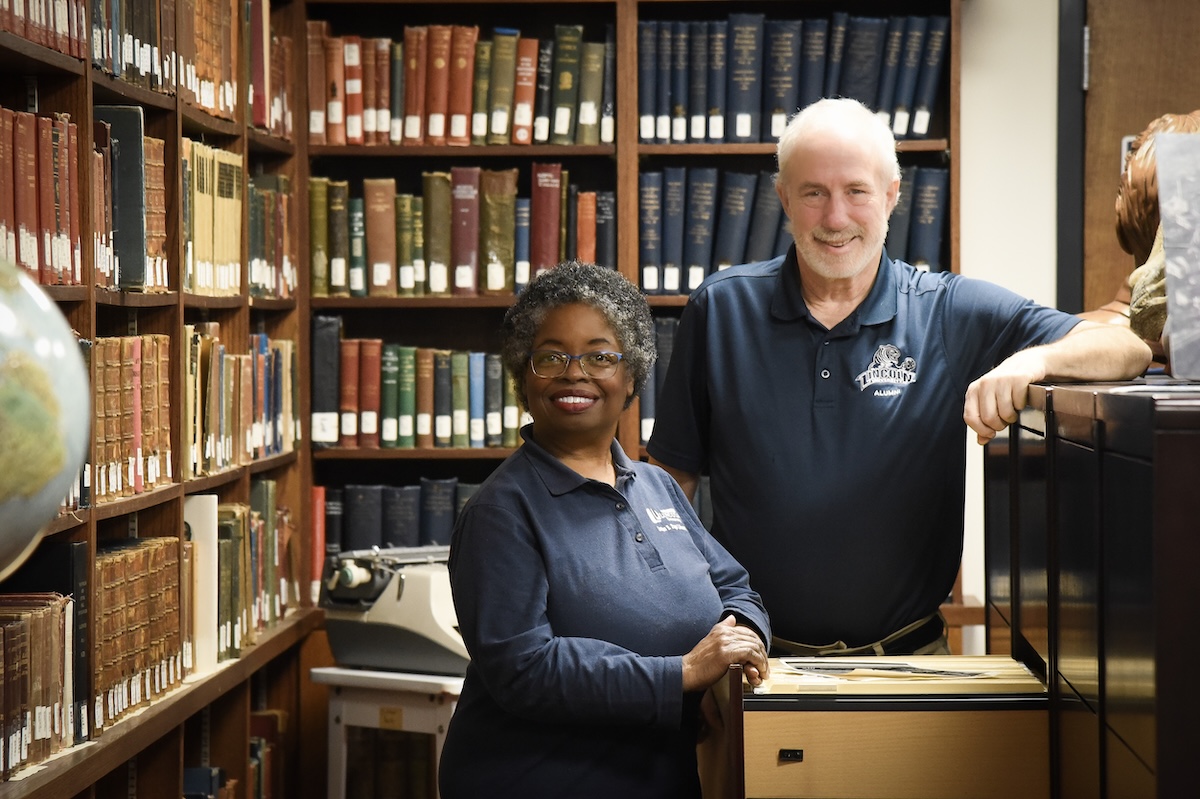 Ithaca Byrant ’84 and Mark Schleer ’07 of the Lincoln University of Missouri Archives. Photo by Rebecca Rademan.
Ithaca Byrant ’84 and Mark Schleer ’07 of the Lincoln University of Missouri Archives. Photo by Rebecca Rademan.
At the heart of Lincoln University’s Archives are two dedicated individuals committed to preserving and sharing the institution’s rich history: Mark Schleer ’07, director of Archives and the Ethnic Studies Center, and Ithaca Bryant ’84, library assistant and assistant to Schleer. Together, they work tirelessly to safeguard the university’s legacy, ensuring its history remains accessible and celebrated for generations to come.
Mark Schleer ’07: Preserving LU’s Legacy
As director of the Archives and Ethnic Studies Center, Schleer’s primary responsibility is to “maintain, preserve and make accessible the heritage and holdings of the university,” he said. Beyond preservation, Schleer and his team also engage in research and outreach to educate both the university community and the public about Lincoln’s history.
Schleer’s connection to Lincoln University is both personal and historical. A 2007 graduate with a Master of Arts in history, Schleer’s family has ties to the university that span generations. His great-great-grandfather owned a hardware store that, since 1867, hired Lincoln students to help drive delivery wagons. “Lincoln was always our best customer,” he said. These family ties help fuel Schleer’s passion for his work.
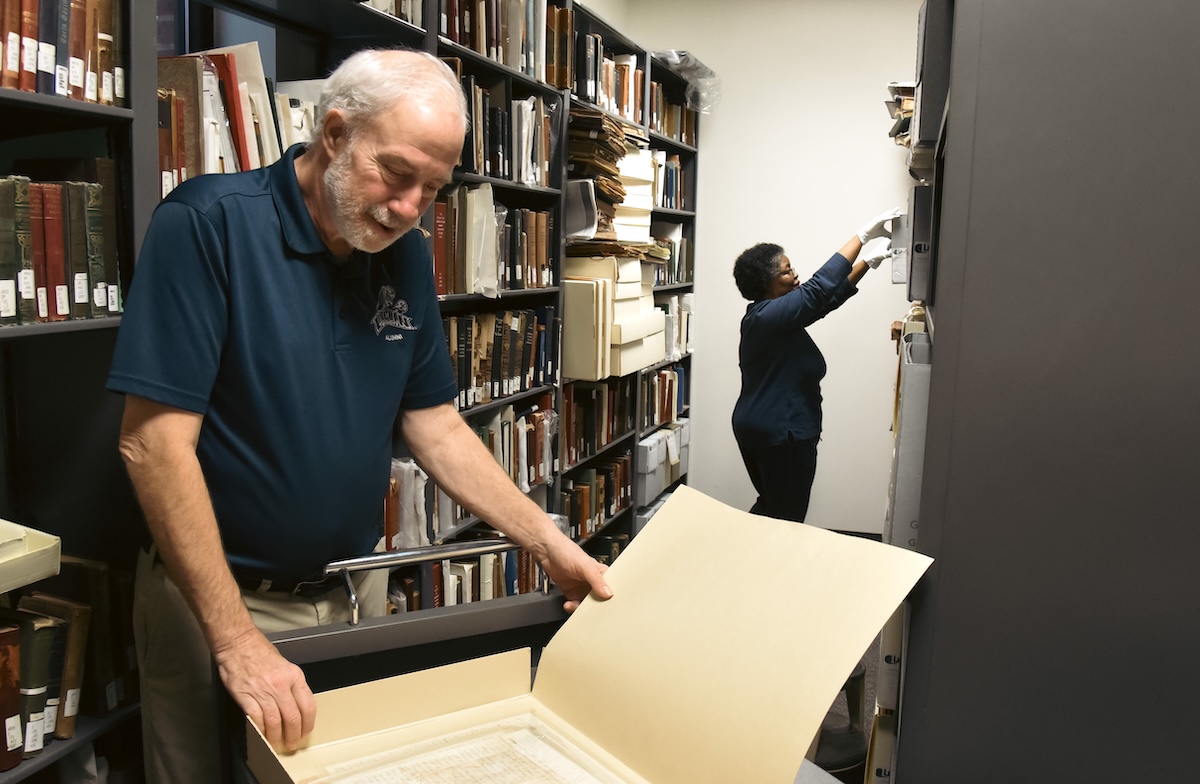 The University Archives & Ethnic Studies Center is located on the third floor of Inman E. Page Library. It serves as the official repository for the historical records and documents of Lincoln University of Missouri.
The University Archives & Ethnic Studies Center is located on the third floor of Inman E. Page Library. It serves as the official repository for the historical records and documents of Lincoln University of Missouri.
“I went to this seminar several years ago, and the guy making a speech was saying, ‘You are the stewards of history.’ And I thought, that sounds really cool. I’m a steward of history,” he said. That sense of stewardship drives him to safeguard Lincoln’s past, particularly the university’s origins, which he finds inspiring. “My favorite story about Lincoln is how a group of formerly enslaved soldiers were able to not only found but to fund an institution of learning that has been successful for 159 years,” he said. “I don’t think there’s any other school that can say that.”
Schleer’s team also works on educational outreach, helping new students understand the significance of their new academic home. “I think it’s important for them to be aware of the history and heritage of this new place that’s going to be their home for the next few years,” he said. “Kind of gives them a sense of belonging.”
A key part of that work is the help of student workers who assist with the daily operations of the Archives. “One of the best parts of the day is working with our student workers,” Schleer said. “And they're all very enthusiastic about Lincoln history, and they really helped the archives to shine. And to be honest, they really give you hope.”
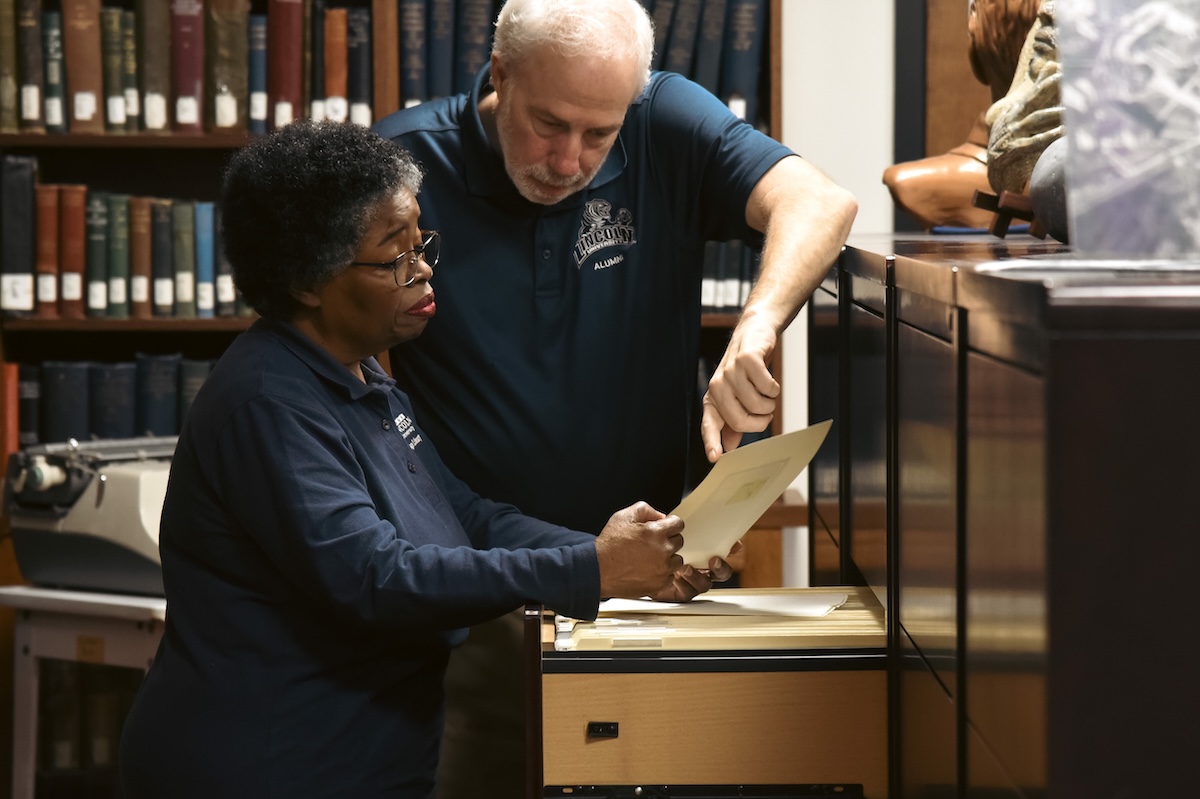 In the Archives, Bryant and Schleer strive to preserve the University's history while providing access to the materials for patrons throughout the institution and the community.
In the Archives, Bryant and Schleer strive to preserve the University's history while providing access to the materials for patrons throughout the institution and the community.
Despite the challenges of staffing and funding, Schleer’s passion for preserving Lincoln’s history is unwavering. One of the most thrilling moments in his tenure came in 2009 when he discovered a hidden time capsule inside Jason Gymnasium. “That was really neat,” he said, recalling the excitement of unearthing historical materials, including Lincoln University publications and even a deflated basketball.
Looking ahead, Schleer is hopeful for the future of the archives, particularly for the establishment of a museum. “Sometimes we have too many artifacts and artwork that we can’t display due to limited space and funding,” he said. Meanwhile, efforts are underway to digitize and upload materials to the Blue Tiger Commons to make Lincoln’s history more accessible.
Ithaca Bryant ’84: A Passion for Preservation
Ithaca Bryant plays a crucial role in the Archives as a library assistant and assistant to Schleer. Her daily duties are varied, from assisting patrons and processing interlibrary loans to working on digitization and outreach projects. “A typical day involves sitting at the circulation desk for an hour or two, getting together the daily interlibrary loans, processing requests, assisting patrons and working on digitization and outreach,” Bryant said.
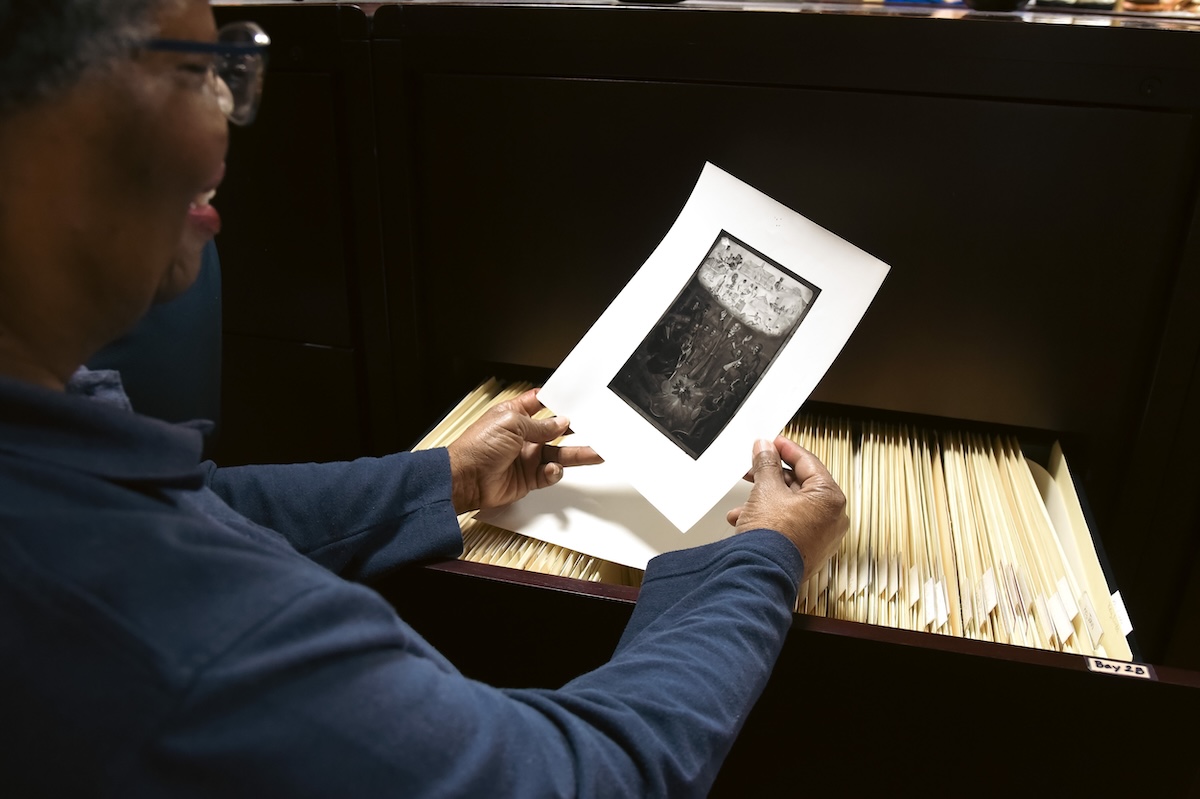 Part of the Archives’ mission is to promote cultural awareness through ethnic-related lectures, exhibits and displays of archival artifacts and art.
Part of the Archives’ mission is to promote cultural awareness through ethnic-related lectures, exhibits and displays of archival artifacts and art.
A 1984 graduate of Lincoln University with a degree in fashion merchandising, Bryant’s personal history is deeply entwined with the school. “Resilient, resourceful, responsible” are the qualities Bryant attributes to a Blue Tiger, and she brings those same traits to her work in the Archives.
Bryant’s passion for preserving Lincoln’s history is rooted in the belief that it’s vital to “keep the soldier’s dream alive.”
“Most people assume that Lincoln was started by white people like the other HBCUs, but that’s not true,” Bryant said. “Yes, Richard Foster got them going, but it was the 62nd and 65th [regiments] that wanted to start the school for their friends and relatives so that they could receive education like the soldiers got in the Army.”
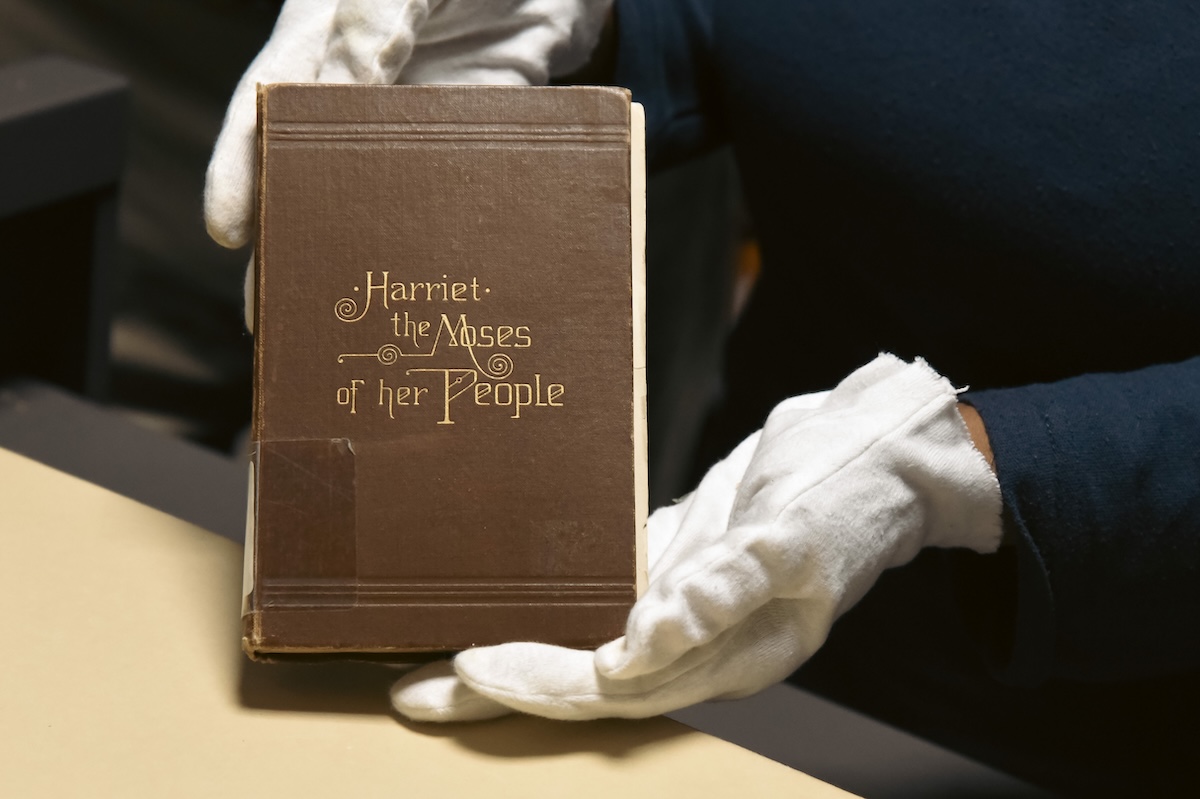 Ithaca Bryant holds a copy of Harriet, the Moses of Her People, signed by Harriet Tubman.
Ithaca Bryant holds a copy of Harriet, the Moses of Her People, signed by Harriet Tubman.
She enjoys watching visitors’ reactions when Schleer asks, “Do you know of any other HBCU in the country that was started by formerly enslaved men?” Their eyes widen in amazement, and Bryant finds joy in educating others about the university’s unique origins.
One of her most memorable moments in the archives came when C-SPAN visited to film rare artifacts. “Mark and I showed them the book we have signed by Harriet Tubman,” she said.
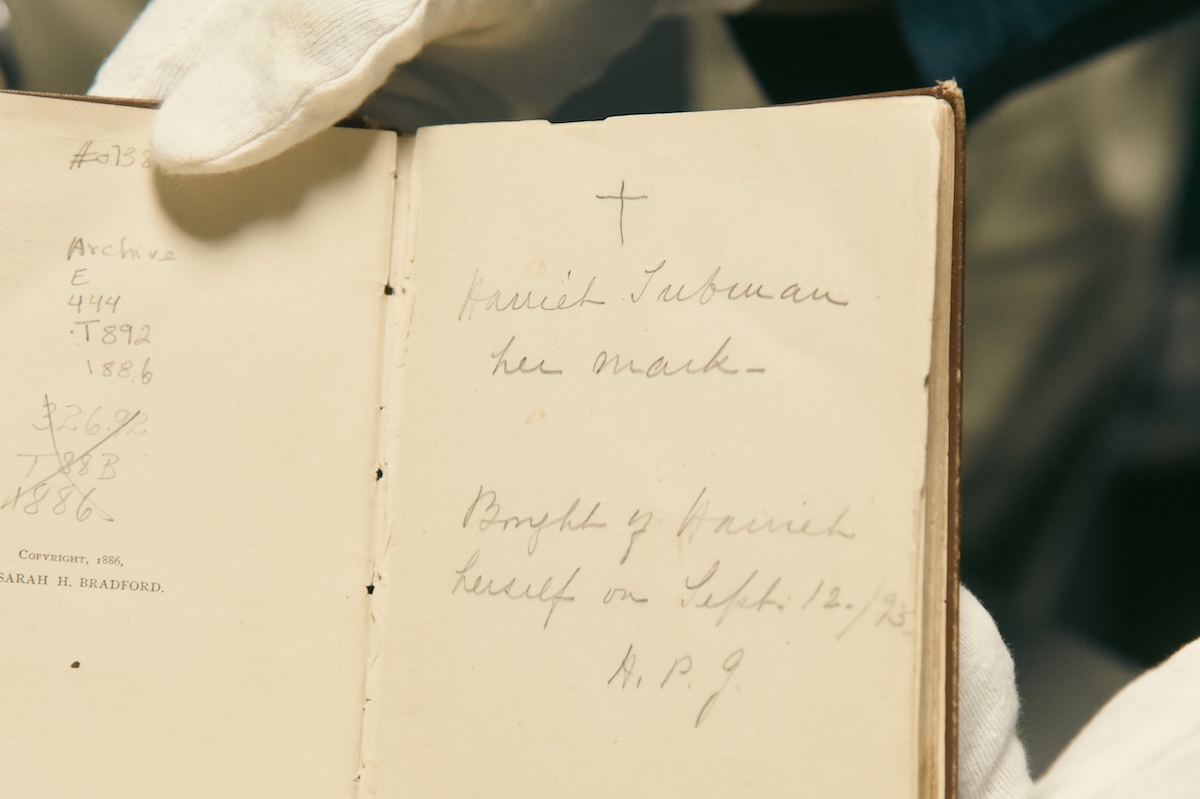 Harriet Tubman’s signature on the inside cover of Harriet, the Moses of Her People, housed in the Lincoln University Archives.
Harriet Tubman’s signature on the inside cover of Harriet, the Moses of Her People, housed in the Lincoln University Archives.
Over the years, Bryant has seen the Archives evolve, particularly in the area of digitization. “Way back in 2007, I was sent to Atlanta to learn about digitization with photographs,” she said. “To this date, we have digitized 61,000 photographs!”
With this extensive digitization work, Bryant looks forward to further progress, including making more materials available through the Blue Tiger Repository. 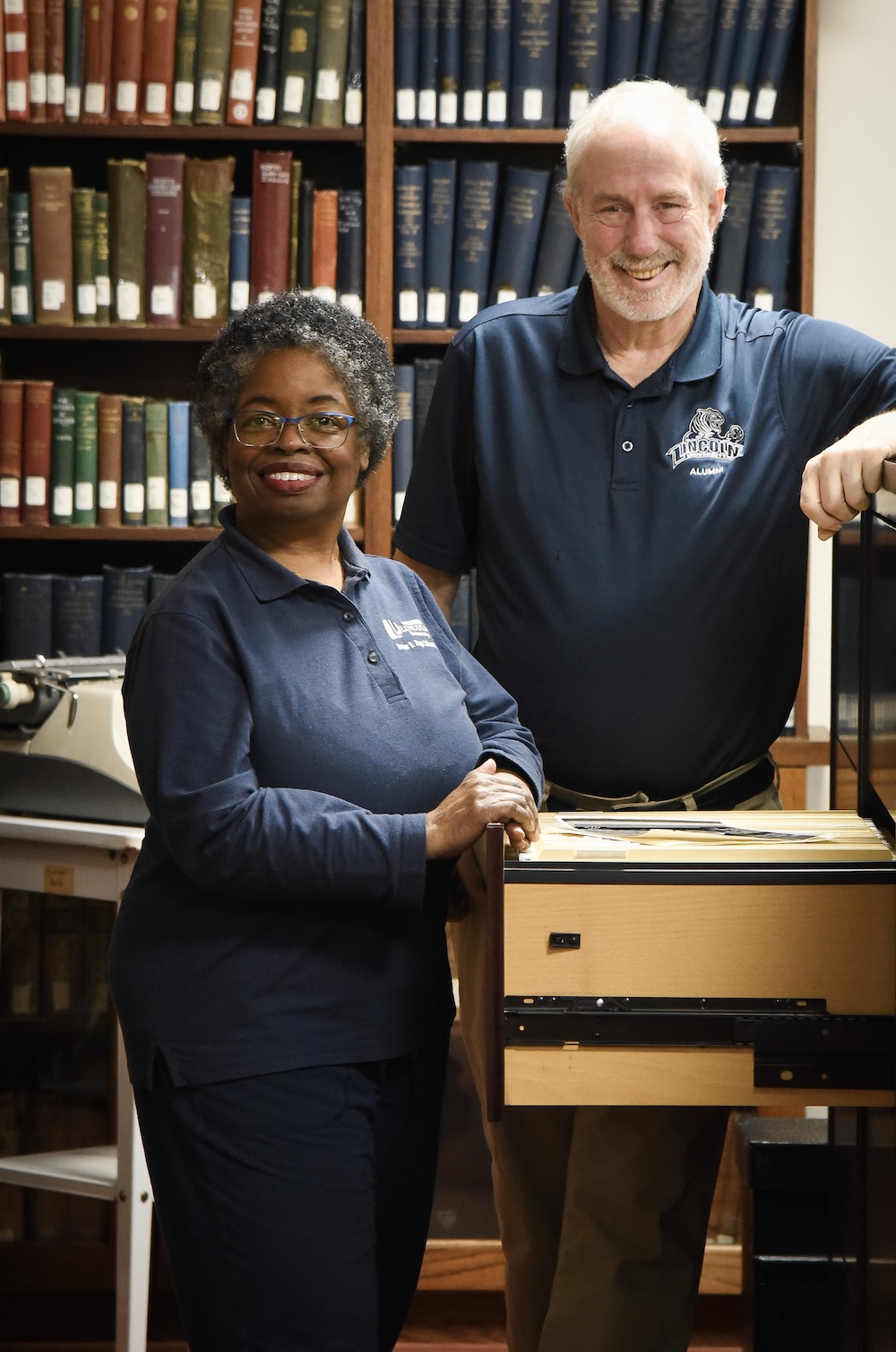
Looking to the Future
Both Schleer and Bryant share a vision for the future of the Archives at Lincoln University. Schleer hopes for continued growth, including expanding the archives and establishing a museum to showcase the many artifacts that are currently in storage due to space constraints. For Bryant, the future is about making the Archives fully accessible through digitization. “As Mark likes to say, students and researchers will be able to be in their bunny slippers, sipping on cocoa at home, and just click on a computer to find what they need in our files,” she said.
Together, Schleer, Bryant and the student workers are dedicated to preserving Lincoln University’s legacy, making its rich history accessible and ensuring that it continues to inspire future generations. “Once it’s gone, it’s gone forever,” Bryant said.
Through their tireless work, the Archives remain a vital part of the Lincoln University community, ensuring that the university’s story is preserved and that its legacy endures.
As Bryant puts it, quoting Lin-Manuel Miranda in his book Hamilton: The Revolution, “Legacy. What is a legacy? It’s planting seeds in a garden you never get to see.”
Thanks to the work of Schleer and Bryant, that garden is growing, and Lincoln University’s history continues to thrive.
Celebrate a decade of dedication to the LU Archives by honoring the anniversary of the Lloyd Gaines: The Man, The Mission, The Mystery exhibition, which marked 10 years on March 31.
Photos by Rebecca Rademan.
